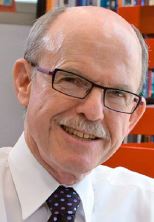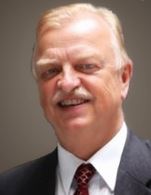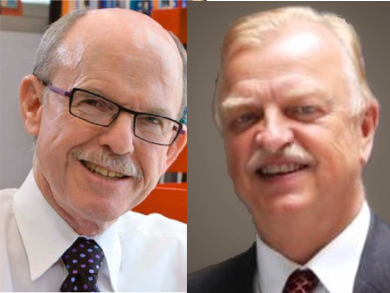In the series “The Nobel Legacy”, Chemistry – A European Journal explores the importance of the Nobel Prizes in chemistry for today’s research. Professor Ken Houk, University of California, Los Angeles (UCLA), USA, is the author of first article in this series and his contribution is dedicated to the first Nobel Prize in Chemistry, which was awarded in 1901 to Jacobus Henricus van’t Hoff.
Dr. Francesca Novara talked for ChemViews Magazine with Ken Houk and Professor Jan Bäckvall, Stockholm University, Sweden, Chemistry – A European Journal‘s long-time Chairman of the Editorial Board, who also is a member of the Nobel Prize committee.
Which Nobel Prizes in Chemistry have inspired you the most throughout your career?
Jan Bäckvall: I think for me personally that the following Chemistry Prizes have inspired me the most: The prize in 1981 on frontier orbital controlled reactions for Kenichi Fukui and Roald Hoffmann; the prize in 2001 on asymmetric catalysis for William S. Knowles, Ryoji Noyori, and K. Barry Sharpless; and the prize in 2010 on cross-coupling reactions for Richard F. Heck, Ei-ichi Negishi, and Akira Suzuki.
Ken Houk: I was most excited about the ones in which I had some involvement, such as R. B. Woodward’s Nobel Prize in 1965, when I was a second-year graduate student in his group. I displayed a champagne bottle he signed at the time in my office. And then in 1987, my second year as a faculty member at UCLA, my colleague Donald Cram got the prize. Richard Heck in 2010, a UCLA double grad and a friend, too, and Fraser Stoddart in 2016, who was a colleague at UCLA for ten years, are right up there, as well, and of course those Prizes that went to my UCLA faculty colleagues, Paul Boyer and Louis Ignarro—I have even been mistaken for Lou on an elevator one day.
When it comes to professional impact on me, the most inspiring Prizes were Roald Hoffmann and Kenichi Fukui for MO models in 1981, John Pople and Walter Kohn for QM computational methods in 1998, and Arieh Warshel, Michael Levitt, and Martin Karplus in 2013 for QM/MM. These involve the kind of chemistry I do now, computational chemistry, and are close to my heart as well, not only for the great chemistry they honor but because these people are my friends, too.
[Editors note: MO = molecular orbital, QM = quantum mechanics, MM = molecular mechanics]
In your opinion, which Nobel Prizes in Chemistry have had the highest impact on the following generations of scientists?
Jan Bäckvall: Since I am an organic chemist, my answer will be influenced by my background. I have to give two answers: (a) The prize in 1912 to Victor Grignard and Paul Sabatier for the discovery of the Grignard reagent and for the development of catalytic hydrogenation, respectively. (b) The prize in 1965 to Robert Burns Woodward “for his outstanding achievements in the art of organic synthesis”.
Ken Houk: Of course the prizes do not have the impact, but instead the discoveries that led to the prizes. I am a computational organic chemist, and so I value all the organic prizes and computational prizes that have been impactful on my field. I also recognize the importance of the enormous developments in instrumentation and techniques leading to prizes for their developers. These have had a huge impact on our ability to do chemistry.
What do you think is the most important role the Nobel Prize plays?
Jan Bäckvall: To identify and award great achievements in chemistry so that they will be exposed to the chemical society. In this way, the new groundbreaking chemistry awarded will stimulate other researchers to make new important achievements in chemistry.
Ken Houk: To bring the field of chemistry in all its variety and impact to the attention of the public and our policymakers. Everyone seems to understand that those things and people who win a Nobel Prize are important.
As the Nobel Prize is only awarded to living scientists, some outstanding chemists have missed out on the Nobel Prize by dying too soon. Are there any developments in chemistry that went un-awarded at the time that you feel should have been honored with a Nobel Prize?
Ken Houk: I can think of a number of chemists who made Nobel-quality discoveries but died without being recognized in this way. Saul Winstein, for whom my research chair is named, made amazing discoveries about ion pairs in solution and established that certain cations and unsaturated systems have unanticipated structures that we now take for granted: “nonclassical” cations and “homo-aromatic” molecules: we are still discovering places where these concepts are important.
Jack Roberts contributed to understanding in the same field, but perhaps more importantly, he brought nuclear magnetic resonance into organic chemistry as a powerful structural tool. R. B. Woodward won the Nobel Prize for synthesis but was expected to win a second for the Woodward-Hoffmann Rules, with Hoffman and Fukui in 1981, two years after Woodward’s death. Jeff Seeman has argued that Woodward should have won even more Nobel Prizes [1]!
Who should be awarded the next Nobel Prize in Chemistry?
Ken Houk: There are so many deserving! I would be delighted if it were to be awarded to Rolf Huisgen and Carolyn Bertozzi. Huisgen established cycloadditions as fantastically general and useful chemical reactions, and Bertozzi developed breakthrough applications of cycloadditions for biology.
I say this partly because this is a field in which I have been immersed my whole life—Huisgen had as much impact on my career as Woodward—and my younger friend Carolyn Bertozzi seized upon special types of these reactions and developed unique applications that have enormously influenced the field we now call Chemical Biology.
The Nobel Committee for Chemistry is responsible for proposing Laureates for the Nobel Prize. The Royal Swedish Academy of Sciences then selects the Nobel Laureates from among these candidates.
Jan, from your experience in the Nobel Committee for Chemistry, how do you know that a chemistry achievement is really groundbreaking?
Jan Bäckvall: It is not always easy to know if an achievement is groundbreaking. In the Nobel Committee, you start to have the opinion that a particular achievement is groundbreaking based on your own judgment. A second hint are the nominations coming into the Committee. If an opinion is further strengthened by a number of external reviewers selected by the Committee, the achievement is considered to be groundbreaking.
How did you get into the Nobel Committee for Chemistry?
Jan Bäckvall: I was nominated by the members of the Nobel Committee.
Ken, what prompted you to agree to prepare a Minireview for “The Nobel Legacy” series of Chemistry – An European Journal?
Ken Houk: I was honored to be approached by the Editors to do the first Minireview, related to the first Nobel Prize in Chemistry. It was awarded in 1901 to van ‘t Hoff “for his discovery of the laws of chemical dynamics and osmotic pressure in solutions”.
It turns out that we can trace what we do in our group back to van’t Hoff’s early discoveries. I think that this recognition that we, in 2018, are indebted to discoveries made long ago is important, and I am glad to have the opportunity to do that [2].
Jan, you are the Chairman of the Editorial Board of Chemistry – A European Journal. What does that mean for you?
Jan Bäckvall: As the Chairman of the journal, I have been involved in a number of policy matters as well as in cases where there have been conflicts between authors publishing in the journal. I have experience in identifying new board members, as well as in inviting authors to write reviews for the journal.
I have also seen Chemistry – A European Journal developing into a high-quality journal that publishes the best full papers in the general area of chemistry in Europe.
And you, Ken, as a Board Member?
Ken Houk: I have enjoyed being in on discussions of the policies of the journal, and I do some adjudications on papers for which different recommendations are made by different reviewers. I have enjoyed watching the journal become such an important part of chemistry with innovations often adopted elsewhere.
Thank you both for the interview.
References
- [1] J. I. Seeman, Synthesis and the Nobel Prize in Chemistry, Nature Chem. 2017, 9(10), 925–929. https://doi.org/10.1038/nchem.2864
- Francesca Rita Novara, Haymo Ross, Editorial: The Nobel Legacy: A Journey through Chemistry Inspired by the Achievements of Nobel Laureates, Chem. Eur. J. 2018. https://doi.org/10.1002/chem.201800664
- [2] Zhongyue Yang, K. N. Houk, The Dynamics of Chemical Reactions: Atomistic Visualizations of Organic Reactions, and Homage to van ’t Hoff, Chem. Eur. J. 2018. https://doi.org/10.1002/chem.201706032

Among many awards, Ken Houk has received the 2003 American Chemical Society (ACS) Award for Computers in Chemical and Pharmaceutical Research, the 2009 Arthur C. Cope Award from the ACS, and the 2012 Robert Robinson Award from the Royal Society of Chemistry (RSC). He is a Fellow of the American Academy of Arts and Sciences since 2002, a Member of the International Academy of Quantum Molecular Science since 2003, and a Member of the National Academy of Sciences since 2010.
His research interests include theoretical and computational organic chemistry, in particular, rules to understand reactivity, computer modeling of complex organic reactions, and experimental tests of the predictions of theory, as well as theoretical investigations and the design of enzyme-catalyzed reactions, quantitative modeling of asymmetric reactions used in synthesis, and mechanisms and dynamics of pericyclic reactions and competing diradical processes.

His research ranges from palladium-catalyzed oxidative carbocyclizations, dynamic kinetic resolution, and organometallic transformations on to directed evolution.
Bäckvall is a member of the Nobel Committee for Chemistry and chairman of the Editorial Board of Chemistry – A European Journal and a member of many editorial advisory boards (e.g., Journal of the American Chemical Society, Beilstein Journal of Organic Chemistry, Tetrahedron, and ChemCatChem).



